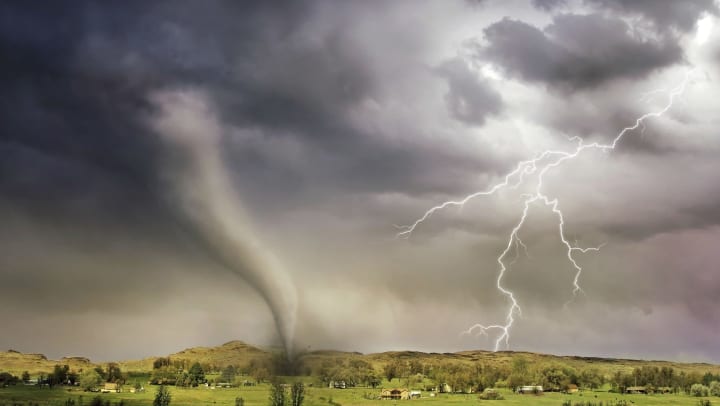Most tornadoes occur between noon and midnight, the warmest time of the day, which provides the lift for the formation of severe thunderstorms. It is crucial to prepare for these types of extreme weather.
Know The Difference
Tornado Watch - A tornado watch means tornadoes are possible in and near your area. Be ready to act quickly!
Tornado Warning - A tornado warning means take action! A tornado is near and dangerous conditions require you to move to a safe location immediately.
What You Should Do Before A Tornado
Preparing for tornadoes is the best way to ensure you and your family stay safe and are ready to evacuate if needed. Here are some ways you and your family can prepare for a tornado:
-
The best defense in your home, especially in the overnight hours, is having a National Oceanic and Atmospheric Administration (NOAA) weather radio for the latest tornado watches and warnings. Stay informed of weather conditions by tuning into local radio and television stations, and take all watches and warnings seriously.
-
Locate a safe room within your home that will fit all your family members. Some Liberty Military Housing homes in Missouri have basements for this purpose.
-
Practice tornado drills with your family. Come up with a plan together and practice moving quickly to your identified safe locations.
-
Gather supplies for a go-kit and a stay-at-home kit. Both kits should include food, water, and medicine. Your go-kit should have three days worth of supplies that you can carry with you, including batteries and chargers for all your devices. Your stay-at-home kit should include at least two weeks of supplies.
-
Have personal, financial, and personal records easy to access. Consider having essential documents backed up on your computer or a hard drive if your original copies are destroyed.
Click here for a tornado safety checklist to help you prepare and plan.
RedFlag Emergency Notification System
RedFlag is an emergency notification system that enables the instantaneous distribution of emergency and high-priority informational messages related to Liberty Military Housing communities. RedFlag notifications will alert you via text message and email and can assist you in preparing for an impending storm, such as a tornado. To ensure you receive these notifications, it is important to keep your email address and cell phone numbers up to date at all times. You can contact the district office to confirm the numbers we have on file.
What You Should Do During A Tornado
Closely monitor weather conditions for information about tornado watches and warnings to be ready to take action. Once a warning is issued, or if you suspect a tornado, seek safe shelter immediately. Additionally:
-
If an underground shelter is unavailable, move to an interior room or hallway on the lowest floor and get under a sturdy piece of furniture.
-
Stay away from windows.
-
Get out of automobiles.
-
Do not use a highway overpass as shelter.
-
Do not try to outrun a tornado in your car; instead, leave it immediately.
-
If caught outside or in a vehicle, lie flat in a nearby ditch or depression.
What You Should Do After A Tornado
Monitor radio, tv, or other news sources and stay in your shelter until the tornado warning is over. Do not enter damaged buildings; if the building you are in is damaged, exit carefully and do not go back in. Be aware of things that may fall or dangerous debris. Be alert, and if you smell gas or see spills that could be flammable, leave immediately. Stay clear of fallen power lines or broken utility lines.
Notify Liberty at Your Service immediately for any maintenance concerns with your home. Easily submit maintenance requests or check the status of a request at any time using our maintenance app or contact our Liberty At Your Service 24/7 at 888-578-4141.
Clean Up Safely
When you are ready to begin cleaning up, wear gloves, thick-soled shoes, and long pants to reduce injuries. Do not allow children to take part in disaster clean up. Be aware of carbon monoxide poisoning. Carbon Monoxide can not be seen or smelled; if you start feeling sick, dizzy, or weak, get to fresh air immediately!
For more information about how you and your family can prepare for a tornado, read Tornado Safety Tips from ready.gov.
Sources:


